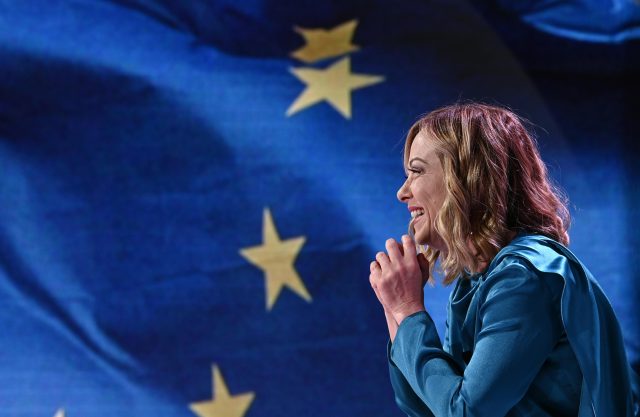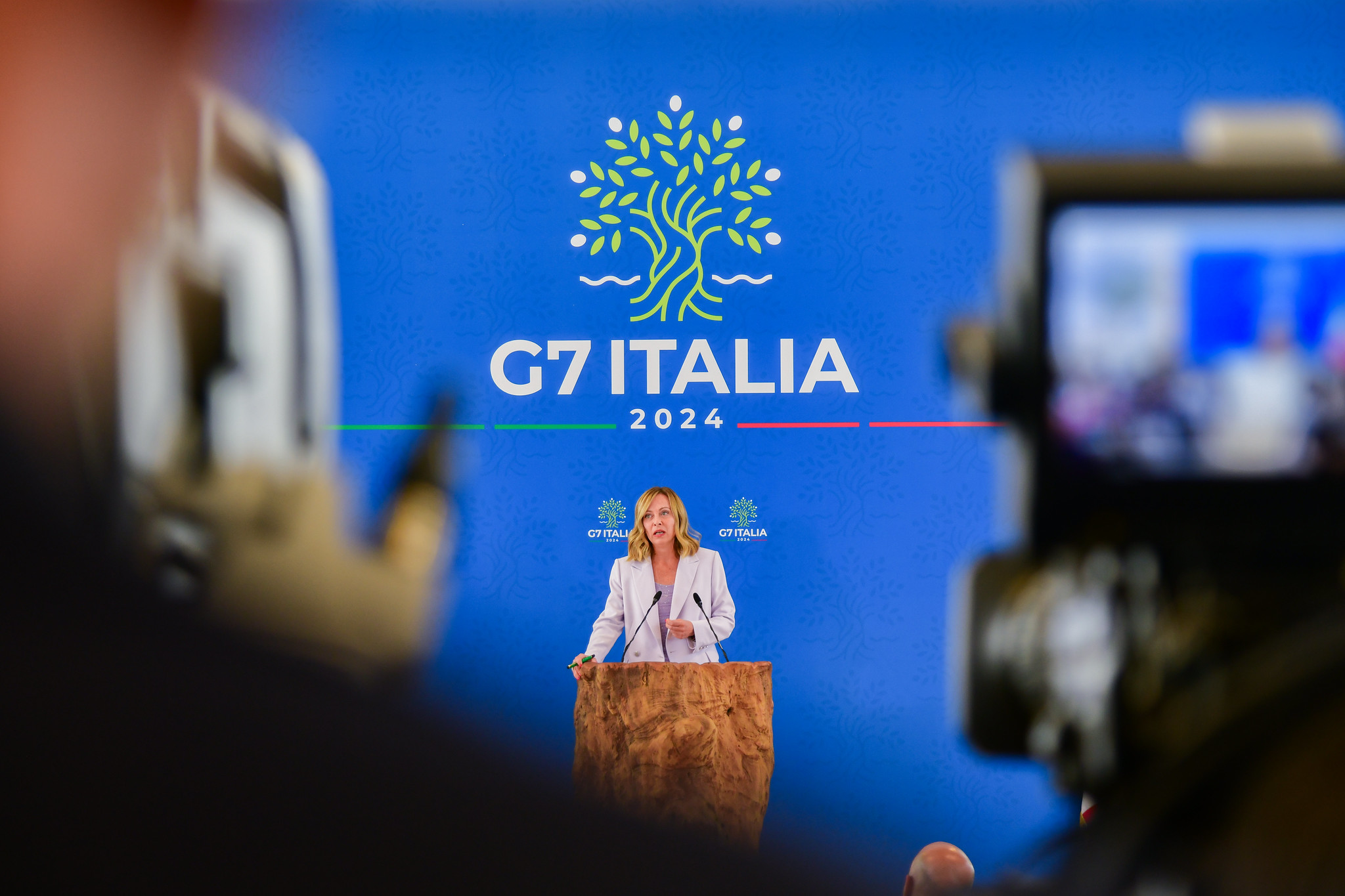
At the G7 summit in Borgo Egnazia, Italy, Italian Prime Minister Giorgia Meloni showed a strong and determined image and succeeded in pushing through her agenda. In a meeting characterized by analysts as one of the weakest in the group’s history, Meloni stood out as the only leader who achieved what she set out to achieve. The choice of the Borgo Egnazia resort, a symbol of the link between East and West, and the summit’s logo, the secular olive tree, emphasized Italian identity and international cooperation. For the first time, Pope Francis attended the summit, addressing topics such as artificial intelligence and the ban on autonomous weapons.
Giorgia Meloni won significant concessions in the summit’s final declaration, managing to remove references to “safe and legal abortion” and soften language on funding for vaccination. Even in the face of opposition from leaders such as Emmanuel Macron, Meloni stood firm, demonstrating her influence. On the issue of the 50 billion dollar loan for Ukraine, the Italian PM managed to establish that the European Union would not be directly involved, leaving the main contribution to other G7 member states. These achievements underline his leadership and ability to advance his national goals on the international stage.
Far from being a show of force designed to provide security assurances in the context of the already fraying Russo-Ukrainian war and a Middle East inflamed by the fight between Israel and Hamas, the G7 summit in Borgo Egnazia in mid-June was more a picture of the failure of the current administrations of the major Western European powers.

The gathering of G7 leaders in the Italian resort emerged as one of the weakest in the group’s history, commented political analysts, who noted one exception. Amid the six gentlemen – leaders in Washington, Tokyo, Ottawa, London, Berlin, London and Paris – who have gone through elections from which they emerged weakened or facing electoral contests in which the odds of winning are no slimmer than losing, the lone woman, Italian Prime Minister Giorgia Meloni, emerged as the only force.
Giorgia Meloni – the only G7 leader who looked strong
As the host of the meeting, but also the only leader of the “democratic world” to have managed the feat of winning this year’s elections – and not just anyway, but after two years in office, Italy’s Prime Minister Giorgia Meloni managed to push her own agenda at the G7 summit, turning the meeting into a personal project designed to bring success to Italy.
The “Family Photo” shows current White House front-runner Joe Biden, facing a very tight election race, taking the fall for his son’s recent conviction on gun-running charges; Canada’s Prime Minister Justin Trudeau, uncomfortably uncomfortable in the face of the impending election campaign, talking about his exit from the political scene; British Prime Minister Rishi Sunak and French President Emmanuel Macron, also facing seemingly unwinnable elections, and Japanese Prime Minister Fumio Kishida at a point in his political career where he is polling weaker than ever. Last but not least in the group photo is German Chancellor Olaf Scholz, who was “crushed” in the last election, defeated by far-right forces. And among them is Rome’s leader Giorgia Meloni, who displayed her “arch-conservative credentials” alongside an image full of confidence in her international leadership skills.
At the start of the Summit, she explained that the choice of Borgo Egnazia was no coincidence, as it is located in the Puglia region, which for centuries has been seen as a bridge between East and West, as a land of “dialog in the heart of the Mediterranean, that middle sea that links the two great maritime areas of the world: the Atlantic on one side and the Indo-Pacific on the other”. Giorgia Meloni also spoke proudly about the choice of the logo of the meeting: the secular olive tree, another symbol of Italian identity, among whose leaves are seven olives symbolizing the cooperation of the seven great nations on global challenges. And, on the same occasion, the Fratelli d’Italia leader also delivered a message to show that her party is a cosmopolitan one:
“The G7 is not a fortress closed to others, which may have to defend itself in some way; it embodies values that we open to the world to promote common development”.
A historic and first-ever presence at the Group of Seven: Pope Francis
Beyond the contrasting touches he managed to apply to the picture of the summer G7 meeting, the Italian politician also managed another first: inviting the Pontiff to the summit, with whom each of the participants had something to discuss at some point.
Pope Francis gave a historic speech to the G7 leaders about artificial intelligence, which could become either a terrifying or a creative tool, depending on the decision of the world’s powerful. He also called for a ban on the use of autonomous weapons in warfare.
Although isolated, Giorgia Meloni got all
The 36-page summit declaration contains a long list of political declarations of intent on topics ranging from climate protection to digitization of the economy, higher taxes for the rich and citizens’ right to healthcare. Even so, Giorgia Meloni has managed to get her point of view across and the final text lacks a reference to “safe and legal abortion”, a phrase already agreed last year at the Hiroshima summit. Moreover, according to sources present at the meeting and quoted by the international press, the head of state in Rome not only opposed the inclusion of the reference to abortion – a subject she has repeatedly spoken out against – but also called for the language on the passages on the financing of vaccination to be “toned down”.
Later, the Italian Prime Minister explained – regarding the lack of references to abortion – that the reason for this was to avoid repetition of last year’s text. According to Giorgia Meloni, issues once settled should not be taken up again, and there was not even a controversy on the subject during the summit.
She was contradicted, however, by French President Emmanuel Macron, who later pointed out that “France’s vision is that of equality between women and men, but this vision is not shared across the political spectrum”. In response, Meloni said that Emmanuel Macron was deeply mistaken to use the summit to campaign for election.
American sources quoted by Reuters also spoke of Meloni’s strong-arm stance, saying that President Bidean “backtracked” on the abortion issue after being told that “Mrs. Giorgia Meloni does not want the words abortion and reproductive rights included in the text of the declaration”. Despite being isolated, Giorgia Meloni got what she wanted, sources quoted by Reuters claimed, and not only on the abortion issue.
Controversy among G7 leaders over $50 billion loan to Ukraine
The Russian-Ukrainian war was also on the agenda at the G7 meeting in the Italian resort, and Volodymyr Zelensky was among the guests and even signed bilateral security agreements with his counterparts in Washington and Tokyo. The subject of controversy between the Group of 7 leaders was the 50 billion dollar loan to Ukraine from the interest accrued in the funds in which Russian assets are frozen. Here too Giorgia Meloni scored a victory, which she announced at the end of the meeting in her capacity as its chair: EU member states will not be directly involved in the loan for the time being.
According to Meloni, the loan will be provided by the United States, as well as Canada, Britain and most likely Japan, within its constitutional constraints, with the European bloc’s contribution being to provide a guarantee mechanism for the loan repayment. The Italian Prime Minister concluded the meeting in Borgo Egnazia with a reference to the upcoming negotiations for top EU posts, expressing the hope that the EU will take into account in its policies the “message” sent by European citizens in the recent European Parliament elections, who voted massively for the conservative and far-right. Without making clear-cut references to the position of her party and Italy, she left the door open for discussions, even though she said that the EPP, as winner of the European Parliament elections, would be the one to nominate the next head of the European Commission, and that she could be understood to be supporting the incumbent Ursula von der Leyen for another term.



 Subscribe
Subscribe